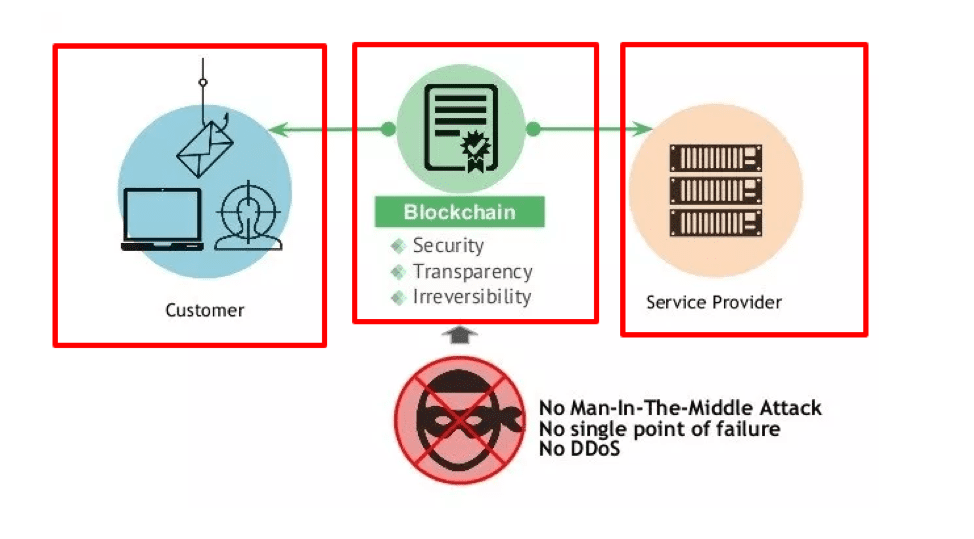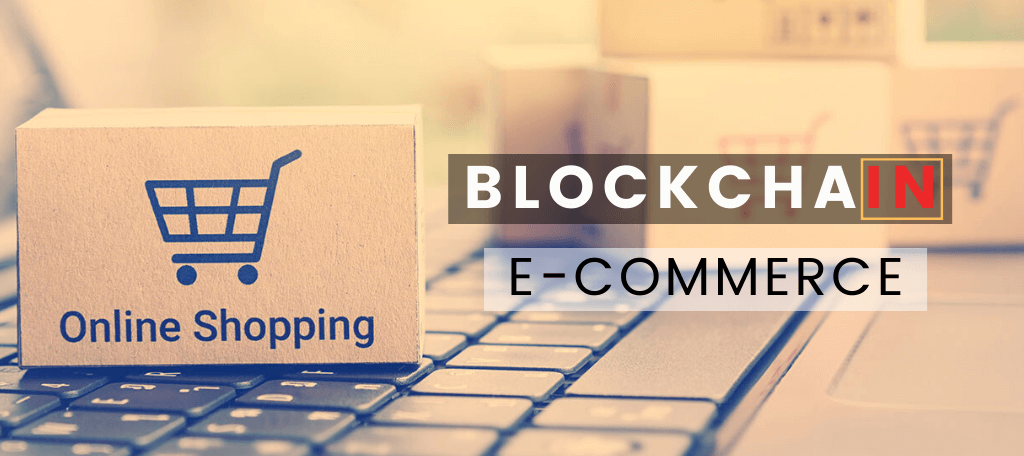The eCommerce has been around for a while, and it has revolutionized the way we shop. It has also created new opportunities for entrepreneurs to start their own businesses. However, traditional e-commerce platforms have their limitations, such as high fees, lack of control, and vulnerability to cyberattacks. This has led to the rise of decentralized e-commerce platforms, which offer a new way of doing business. Decentralized Ecommerce platforms use blockchain technology.
Role of Blockchain in eCommerce
Blockchain is a distributed ledger technology that records transactions on a decentralized network of computers. Each block in the chain contains a cryptographic hash of the previous block, making it secure and tamper-proof. This technology provides a transparent and immutable record of all transactions, making it ideal for ecommerce.
In decentralized ecommerce platforms, blockchain technology is to secure transactions, making them more secure and transparent. Blockchain eliminates the need for intermediaries, such as banks and payment processors, which reduces the cost and time of transactions. This also makes ecommerce more accessible to small businesses and individuals. Blockchain uses cryptographic algorithms to secure transactions, making it virtually impossible for hackers to tamper with them. This reduces the risk of fraud and ensures that transactions are transparent and secure. With blockchain, all transactions are on a distributed ledger, providing a transparent and immutable record of all transactions. This makes it easier to track the flow of goods and money and reduces the risk of fraud.
The users can transact using pseudonyms, protecting their privacy and preventing identity theft. This makes it easier for buyers and sellers to transact without revealing their personal information. Moreover, blockchain enables smart contracts, which are self-executing contracts that automatically enforce the terms of an agreement. This technology eliminates the need for intermediaries, such as lawyers, which reduces the cost and time involved in creating contracts.

How do Decentralized eCommerce Platforms work?
The decentralized platforms use blockchain technology to operate in a peer-to-peer (P2P) network, providing a more efficient and cost-effective way to conduct online transactions. The working of decentralized eCommerce platforms is quite different from traditional eCommerce platforms. In a decentralized platform, there is no central authority that governs the platform. Instead, the platform by a network of nodes that participate in the validation of transactions. Each node has a copy of the blockchain, which contains all the transactions that have ever occurred on the platform.
When a user initiates a transaction, the transaction is broadcast to the entire network of nodes. The nodes then verify the transaction, ensuring that the user has the necessary funds to complete the transaction. Once transaction is verify, it is to the blockchain, and the user’s account is updated accordingly. Decentralized eCommerce platforms also use smart contracts that allow for automated and trustless transactions between two parties. Smart contracts can also be used to automate processes such as payment settlements, order fulfillment, and shipping, making the entire eCommerce process more efficient and cost-effective.
Benefits of Decentralized eCommerce Platforms
Building a decentralized ecommerce platform offers numerous benefits over traditional ecommerce platforms. While there are challenges to building a decentralized ecommerce platform, such as the lack of mainstream adoption, the benefits outweigh the risks, making it a worthwhile investment. These advantages make decentralized ecommerce platforms a viable alternative for small businesses and individuals looking for a more affordable and efficient way to conduct ecommerce transactions.
Secured Transactions
Decentralized ecommerce platforms use blockchain technology, which provides secure and tamper-proof transactions. This technology also uses cryptographic algorithms to ensure that transactions are secure and transparent, making it difficult for hackers to steal or tamper with data.
Easy Procurement
Decentralized ecommerce platforms provide easy procurement options for buyers. With the elimination of intermediaries, buyers can directly connect with sellers, negotiate prices, and complete transactions. This reduces the time and cost involved in the procurement process.
Efficient Supply Chain
Decentralized ecommerce platforms offer an efficient supply chain, which connects buyers and sellers directly. With the use of smart contracts, the supply chain is also automated, making it easier to track goods and manage inventory.
Real-Time Tracking
Decentralized ecommerce platforms provide real-time tracking, which allows buyers to track their orders from the moment they are placed until they are delivered. This also improves transparency and ensures that buyers are informed about the status of their orders.
Seamless Purchase Experience
Decentralized ecommerce platforms provide a seamless purchase experience for buyers. With the use of smart contracts, the purchase process is automated, making it easier for buyers to complete transactions.
Customer Privacy
Decentralized ecommerce platforms provide customer privacy by using pseudonyms instead of real names. This protects buyers from identity theft and fraud, ensuring that their personal information is secure.
Loyalty Reward Programs
Decentralized ecommerce platforms offer loyalty reward programs, which incentivize buyers to make purchases. These programs offer discounts, cashback, and other rewards for loyal customers, encouraging them to make repeat purchases.
Scheduled Delivery
Decentralized ecommerce platforms offer scheduled delivery options, which allow buyers to select a specific delivery time. This ensures that buyers receive their orders at a convenient time, reducing the risk of missed deliveries.
Reasonable Value Worth
Decentralized ecommerce platforms offer reasonable value worth for buyers. With the elimination of intermediaries, buyers can purchase goods at a lower cost, making it more affordable for them.
Flawless Logistic and Transportation Management
These platforms offer flawless logistics and transportation management, ensuring that goods delivere on time and in good condition. With the use of smart contracts, the logistics process is automated, reducing the risk of errors and delays.
Decentralized Ecommerce Platform Development
Developing an ecommerce decentralized platform requires careful planning and execution. The development process involves defining the project scope, choosing the right blockchain, developing smart contracts, designing and developing the user interface, integrating payment gateways, testing and launching the platform, and continuous improvement. By following these steps, it is possible to create a secure, transparent, and efficient ecommerce platform that meets the needs of today’s online shoppers.
Step 1: Define the Project Scope
The first step in developing an ecommerce decentralized platform is to define the project scope. This involves identifying the platform’s objectives, target market, and features. The project scope should also take into account the platform’s technical requirements, such as blockchain integration and smart contract development.
Step 2: Choose the Right Blockchain
The next step is to choose the right blockchain for the platform. Ethereum is the most popular blockchain for building decentralized ecommerce platforms, but other options include EOS, TRON, and NEO. The chosen blockchain should be able to support the platform’s technical requirements, such as scalability and transaction speed.
Step 3: Develop Smart Contracts
Smart contracts are self-executing contracts that automatically enforce the terms of an agreement. They are a key feature of decentralized ecommerce platforms, as they allow for secure and transparent transactions.
Step 4: Design and Develop the User Interface
The user interface is the front-end of the ecommerce decentralized platform. It should be designed to be intuitive and user-friendly, with features such as a search bar, product categories, and shopping cart. The user interface should also be responsive, meaning it should adapt to different devices and screen sizes.
Step 5: Integrate Payment Gateways
Payment gateways are a critical component of ecommerce platforms, as they enable users to make purchases securely. Payment gateways should be integrated with the chosen blockchain, allowing for secure and transparent transactions. Popular payment gateways for decentralized ecommerce platforms include MetaMask, MyEtherWallet, and Trust Wallet.
Step 6: Test and Launch the Platform
Once the ecommerce decentralized platform has been developed, it should be thoroughly tested to ensure that it is functioning correctly. Testing should include functionality testing, security testing, and user acceptance testing. Once the platform has passed testing, one can launch it to the public.
Step 7: Continuous Improvement
The final step in the development process is continuous improvement. This involves monitoring user feedback, analyzing data, and making improvements to the platform over time. Continuous improvement is essential for ensuring that the platform remains relevant and competitive in the rapidly evolving ecommerce market.
Challenges faced by Decentralized eCommerce Platforms
The development and adoption of these platforms also come with several challenges. In this blog, we will explore some of the major challenges of ecommerce decentralized platforms.
Scalability
One of the biggest challenges faced by decentralized ecommerce platforms is scalability. As the number of users on the platform grows, the network becomes more congested, which can lead to slower transaction times and higher fees. This is because each transaction must be verified by the network nodes, which can cause delays when the network is busy
User Adoption
Another challenge is user adoption. Decentralized ecommerce platforms are still a relatively new concept, and many consumers and businesses may not be familiar with them. Convincing users to switch from traditional ecommerce platforms to a decentralized one can be challenging, especially if they are used to the convenience and familiarity of centralized platforms.
Regulatory Compliance
Decentralized ecommerce platforms also face challenges related to regulatory compliance. Traditional ecommerce platforms must comply with various regulations related to consumer protection, data privacy, and anti-money laundering. Decentralized platforms must also adhere to these regulations, but with the added complexity of decentralized technology.
User Experience
The user experience is another important challenge for decentralized ecommerce platforms. Consumers are for a certain level of convenience and ease of use when shopping online. These platforms must meet these expectations to gain user adoption. Issues such as slow transaction times and complex interfaces can deter users from using the platform.
Security
While these platforms are not immune to security threats. Decentralized platforms must ensure that their networks are secure from hacking and other cyber threats.
Why Genesis Convergence is the Best Choice for Your Decentralized eCommerce Platform?
Genesis Convergence specializes in developing decentralized ecommerce platforms. We understand that you are in the market for a decentralized ecommerce platform, and we believe that we are the best choice for your needs.
Here are just a few reasons why you should choose Genesis Convergence for your decentralized ecommerce platform:
Expertise in Blockchain Technology
At Genesis Convergence, we have a team of experts with deep knowledge and experience in blockchain technology. Our team has worked on several decentralized ecommerce projects, and we have a solid understanding of how to leverage blockchain to create secure and transparent transactions for your ecommerce platform.
Customized Solutions
We understand that every business has unique requirements, and we work closely with our clients to create customized solutions that meet their specific needs. Our team will work with you to define the scope of your project, identify the technical requirements, and create a platform for your business.
User-Friendly Interface
We believe that the user experience is a critical component of any ecommerce platform. Our team will design and develop a user-friendly interface that is easy to navigate, with features such as product categories, search bar, and shopping cart. We will also ensure that the interface is responsive, so it can adapt to different devices and screen sizes.
Continuous Support
At Genesis Convergence, we provide our clients with ongoing support even after the project is complete. We will be there to address any issues that arise and provide assistance whenever you need it.

Itís nearly impossible to find educated people for this subject, but you sound like you know what youíre talking about! Thanks